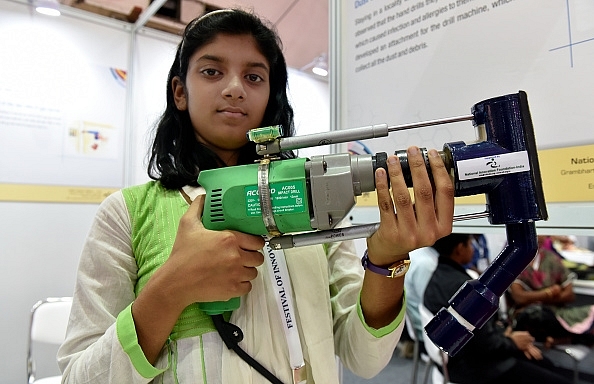
Target $5 Trillion: Inspiring Innovation Within Educational Institutions
For the first time, an elaborate guiding framework for innovation, start-ups and entrepreneurship for students, staff and faculty has been released and we expect that all institutions will adopt it.
India aspires to become a $5 trillion economy by 2024. This will become a reality only if it transforms into a knowledge-based entrepreneurial society.
To achieve this goal, we need to evolve mechanisms to convert the present demographic dividend into a high-quality technical-human resource capable of cutting-edge research and innovation alongside deep-tech entrepreneurship.
Last year, the Higher Education Department of the Ministry of Human Resource Development (MHRD) established its ‘Innovation Cell’ to work on such a holistic approach.
The aim is to prepare a concrete roadmap for enhancing cognitive abilities, higher-order learning skills, out-of-the-box thinking and an entrepreneurship mindset amongst students, especially in higher education institutions.
The Innovation Cell had multiple rounds of formal and informal discussions with all major stakeholders. After talking to a large number of Vice Chancellors, Directors and Deans of higher education institutions, the realisation dawned that most of them were keen to promote innovation and problem-solving ability amongst youngsters but many of them were uncertain about the path they should follow.
They were desperate for the right guidance and support. Moreover, a large number of faculty and students felt that the current system does not incentivise or acknowledge the efforts related to innovation, start-ups and entrepreneurship.
More importantly, many institutions do not have a clear Intellectual Property (IP) policy and revenue-sharing framework.
Given these lacunae, a committee of experts, which I convened, was constituted by the MHRD to prepare a framework for the ‘National Innovation and Startup Policy 2019 for Students and Faculty of Higher Education Institutions.’
This policy was recently released by Ramesh Pokhiyal, the Cabinet Minister for Human Resource Development.
For the first time, an elaborate guiding framework for innovation, start-ups and entrepreneurship for students, staff and faculty has been released and we expect that all institutions will adopt it.
This framework makes key recommendations on IP and revenue-sharing amongst faculty, students and institutions. It also allows students, staff and faculty to take a semester or year’s break to focus on their start-up and then re-join their duties.
For students seriously pursuing entrepreneurship, the policy recommends that rules related to minimum attendance requirements for appearing for exams should be made flexible.
Clarity in IP ownership is key if we wish to create a robust innovation ecosystem. The new policy clearly states that IP will belong to innovators unless they have made substantial use of the institution’s resources or it is generated as a part for their assigned academic activity.
More importantly, even if the IP is jointly shared by innovators and the institution, innovators will have major say on aspects related to its commercialisation or technology transfer.
Regarding the equity-sharing mechanism between innovator and institution, the new policy now only allows the institution to hold a maximum equity of 9.5 per cent in any start-up incubated within its campus and this also depends on the level and quality of support offered by the institution to the start-up. Now institutions simply cannot arm-twist start-up founders.
As per the current regulations, education institutions cannot hold equity in start-ups directly, hence this policy also recommends the institutions establish a Special Purpose Vehicle (SPV) in the form of a non-profit ‘Section 8 Company’ or ‘Society’ to incubate businesses. The SPV can hold equity on behalf of the institution.
Another major recommendation is the creation of an ‘Innovation Fund’ by every institution, which implies allocating at least 1 per cent of its total annual budget to fund activities related to innovation, start-up and entrepreneurship.
This policy also emphasises sensitising and training faculty, staff and students about the need to promote and handhold new ideas, as a majority of good ideas fail to see the light of day due to a non-encouraging ecosystem within our educational institutions.
The new innovation and start-up policy is innovator-friendly and will prove be a game-changer. It will provide the much-needed impetus for promoting an innovation, start-up and entrepreneurship culture in our education institutions.